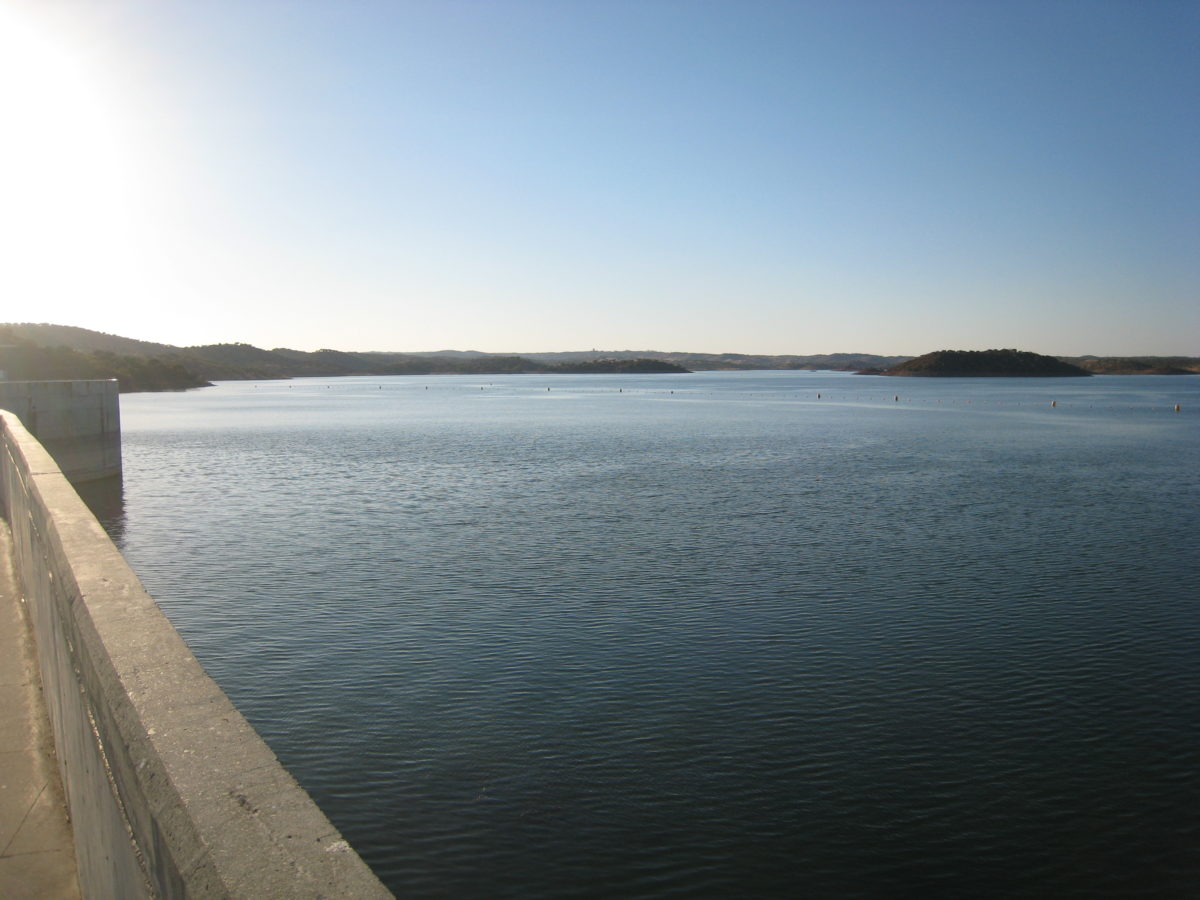Portugal’s Alentejo Regional Coordination and Development Commission (CCDR-A) has publicly released an environmental impact assessment for a 4 MW floating PV project that EDP-Gestão da Produção de Energia, S.A. — a unit of Portuguese power utility EDP — aims to develop at the Alqueva Dam on the River Guadiana, along the border of the Beja and Évora districts in southern Portugal.
The Sistema Fotovoltaico Flutuante do Alqueva project, now at the development stage, will feature around 10,000 PERC half-cell solar modules, each with an output of 385 W, spanning 3.9 hectares of water surface on the Alqueva reservoir, in an area immediately upstream of the dam. The PV system will be divided into five sub-units, each spaced about 13.5 meters apart from each other.
The plant will have an expected power production of approximately 6 GWh per year. The inverters will be installed on an adjacent floating platform that will be connected to the low-tension grid through a floating cable or submarine cable. Cleaning work on the panels will be manually conducted every six months, EDP said in the document.
Work is scheduled to start in the first few months of 2020, with completion expected within three months of the start of construction. The environmental impact study was conducted between November 2018 and January 2019 by local consultancy Nemus Gestão e Requalificação Ambiental Lda. The call for tender for the project will be released in July.
Portugal's first large-scale floating PV plant
Upon completion, the Sistema Fotovoltaico Flutuante do Alqueva project will be the country’s first MW-sized floating PV plant, but not EDP's first floating project. The utility built its first floating PV system with the support of Ciel&Terre in November 2016. The Central Solar Fotovoltaica Flutuante do Alto Rabagão project is a 200 kW pilot installation at the Alto Rabagão Dam on the Rabagão River.
The dam was chosen due to the difficult climate conditions of the surrounding area, which allowed the companies to test floating PV technology under extreme conditions, EDP said in the document issued for public consultation. The water levels at the reservoir were also ideal for assessing the mooring capabilities of the floating array, in addition to evaluating the combination of solar and hydro.
According to Ciel&Terre, the location was chosen due to its high level of difficulty, with an average water depth of 60 meters and surface level variations of more than 30 metres. After the first year of operation, the facility generated around 5% more than its initially projected annual generation target of 300 MWh, according to EDP.
Diversifying activities
EDP's new strategy includes the expansion of its most traditional renewable energy business, wind power, in addition to new investments in storage, solar, off-grid and hybrid wind-solar projects. Its EDP Renováveis (EDPR) unit also recently announced that its Brazilian subsidiary, EDP Renováveis Brasil, has secured a 15-year PPA from an unidentified client in Brazil for the sale of power from a 199 MW solar park that it plans to build in the municipality of Pereira Barreto, in the state of Sao Paulo.
The company has also adopted new blockchain technology, developed by Austria's Riddle&Code, to measure how the amount of power that owners of distributed-generation PV systems in Brazil can self-consume or inject into the grid under net metering.
In March 2018, EDP also completed a 3.3 MW wind and solar PV hybrid demonstration project near Cadiz, Spain, in partnership with Danish wind turbine manufacturer Vestas.
This content is protected by copyright and may not be reused. If you want to cooperate with us and would like to reuse some of our content, please contact: editors@pv-magazine.com.




By submitting this form you agree to pv magazine using your data for the purposes of publishing your comment.
Your personal data will only be disclosed or otherwise transmitted to third parties for the purposes of spam filtering or if this is necessary for technical maintenance of the website. Any other transfer to third parties will not take place unless this is justified on the basis of applicable data protection regulations or if pv magazine is legally obliged to do so.
You may revoke this consent at any time with effect for the future, in which case your personal data will be deleted immediately. Otherwise, your data will be deleted if pv magazine has processed your request or the purpose of data storage is fulfilled.
Further information on data privacy can be found in our Data Protection Policy.